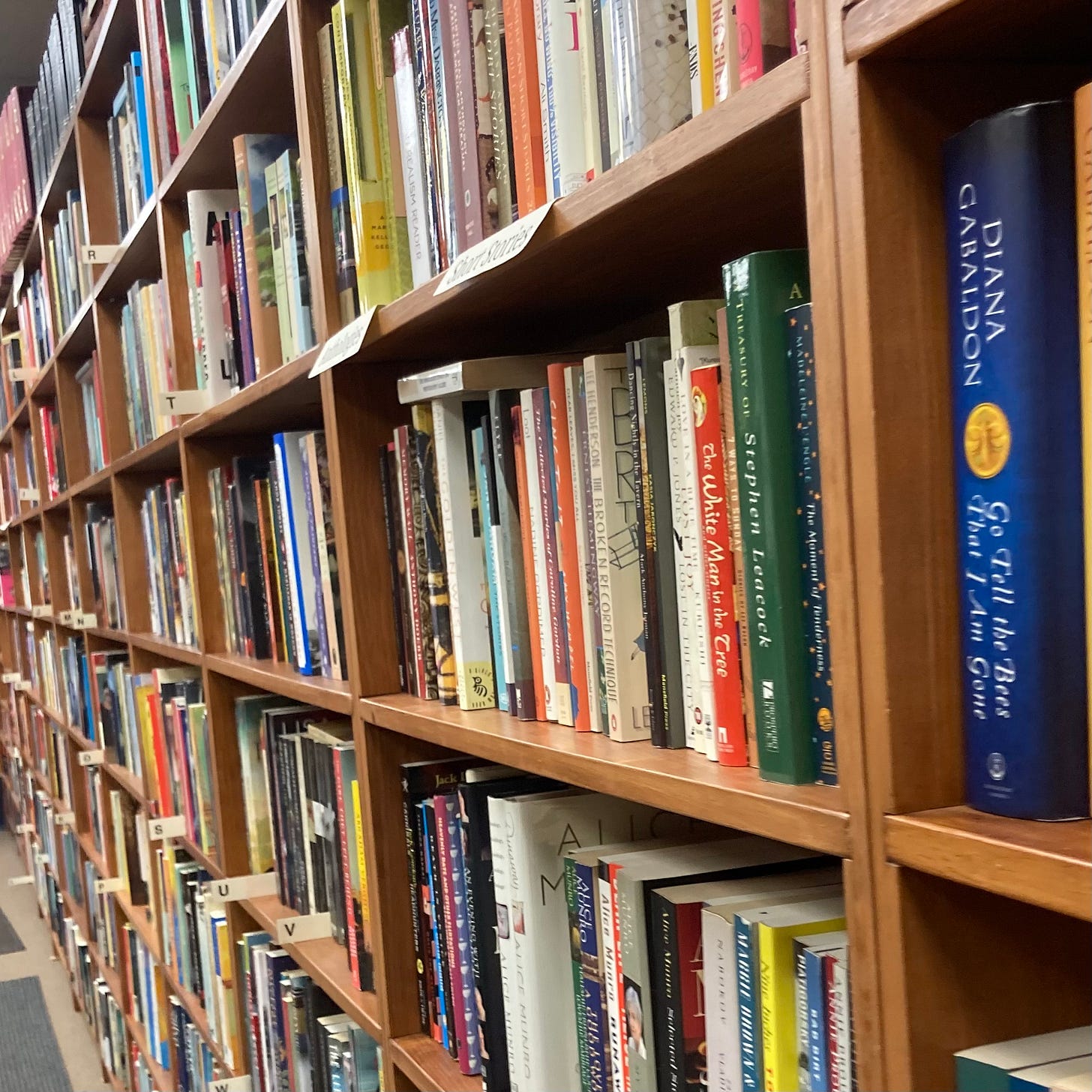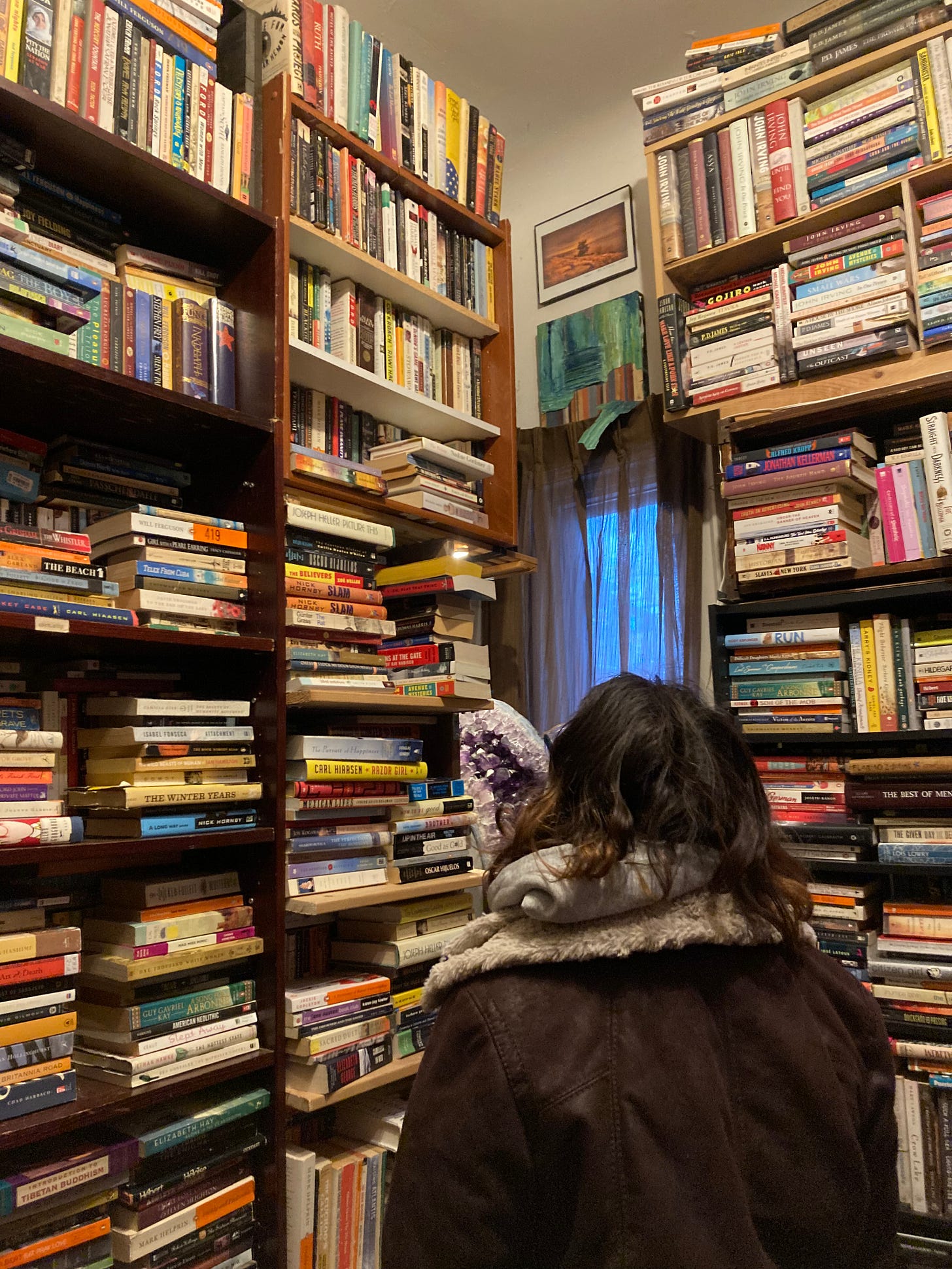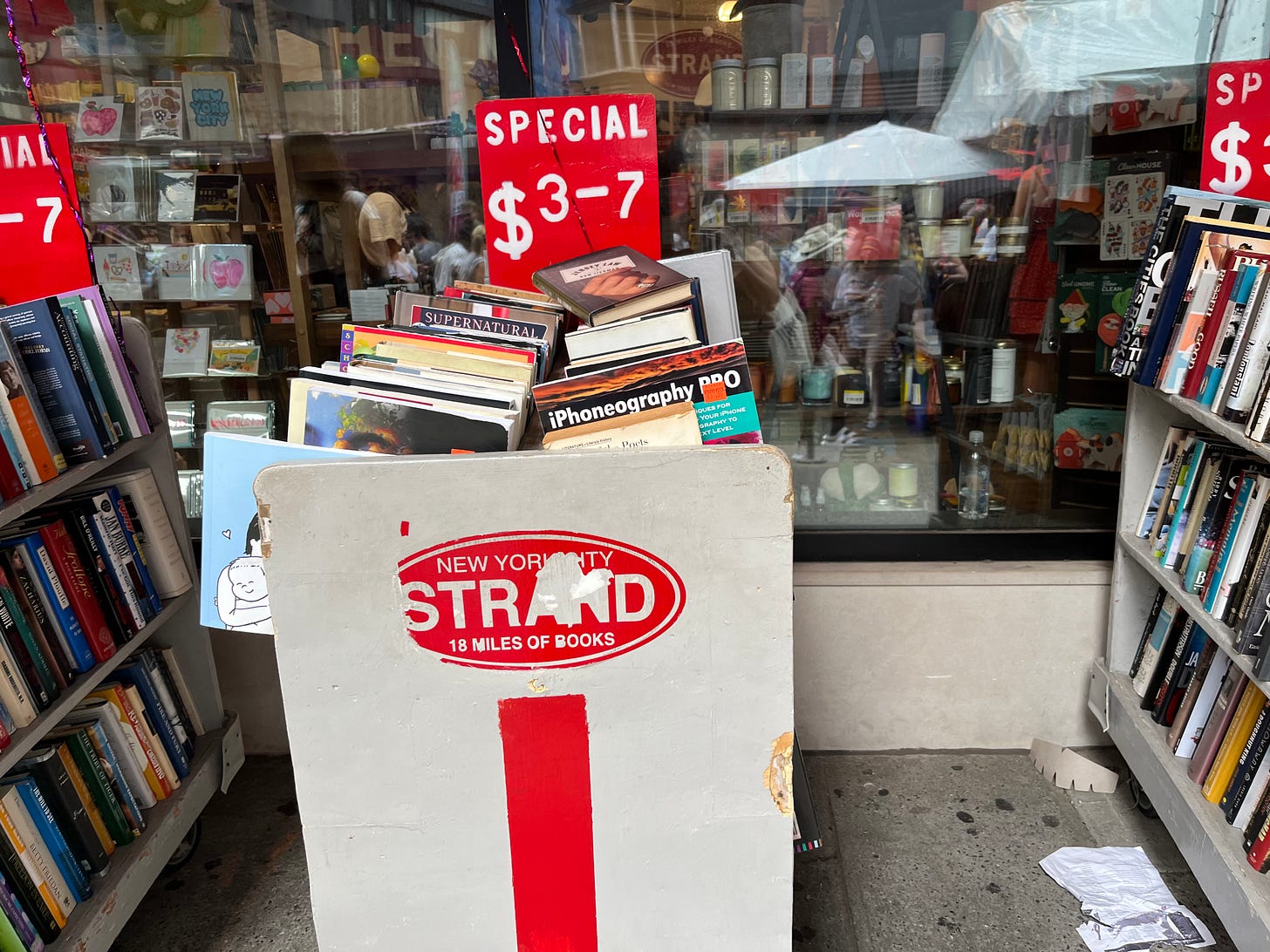My Summer 2024 TBR List
amarah talks about books she hasn't read
I’m drafting this post in the absolute thick of finals season. I don’t actually have time to eat or sleep, let alone make a Substack post. Unfortunately, Senioritis is a real and serious condition. And that’s something I never thought I’d say, because, in a very real way, I love school. I’ve spent the last year gushing about how extremely grateful I am for my Artsci education and how devastated I am that it’s ending. But now that classes are over and I’m just a few assignments away from graduation, I can’t seem to keep my mind on track. As sad as I am to move on, I can’t take my mind off all the free time I’m going to have this summer. I can’t stop fantasizing about how I’m going to spend it.
So, here are some books I’m hoping to read this summer and a little about why I want to read them! Hopefully writing out this list will keep me satisfied until I actually finish my degree. Now, without further ado…
(1) Like Love: Essays and Conversations, Maggie Nelson
This one is an absolute must. If you know me (and, if you’re reading this, you do), you probably know that I’ve been on a bit of a Maggie Nelson kick this year. After reading her essay “The Ballad of Sexual Optimism” for a paper last semester, I was immediately pulled into the Maggie Nelson Literary Universe. Over reading week, I read Bluets and The Argonauts in rapid succession, and they both made me cry.
I still have a ton of older Maggie Nelson books to catch up on, as a relatively new fan, but that doesn’t make it any less exciting that she’s just released a new book – and a book about love, too! I think I will be buddy reading this with Sanjana this summer, so maybe there will be a post about it to come. Stay tuned!
(2) So Late in the Day: Stories of Women and Men, Claire Keegan
A hard launch for those of you who don’t know already: I’m going to school in Dublin next year, to get a Masters in literature.
This is, of course, very exciting and terrifying and uncharted, on an existential level. But on a more immediate level, it also means that I feel morally and socially obligated to do an Irish lit deep dive this summer. Even though I won’t be studying Irish lit specifically, I’m sure it’ll factor heavily into the curriculum, and I want to have a good knowledge base.
More importantly, however, I absolutely cannot go to Trinity next year as a Sally Rooney fan who has not read other Irish lit. Even though I think it is valid and not at all embarrassing to say that Sally Rooney is an artist and a genius, it would be very embarrassing to get typecast as “rabid North American Normal People fan” on my first day at Trinity.
All of which to say, Claire Keegan is one of the contemporary Irish writers I’d love to read. This short story collection is interested in themes of sex and gender, and it just came out last year, so it feels like the perfect Keegan book for me to start with.
Ideally, I’ll be reading the Irish classics this summer too – James Joyce, Oscar Wilde, etc. Comment Irish book recs, if you have any. Classic or contemporary lit – I’m not picky!
(3) Alphabetical Diaries, Sheila Heti
I’ve been wanting to read more Sheila Heti since I read Pure Colour in 2022. Her writing is so inventive and quirky, and it has this sort of ambient quality, where you feel like you’re being slowly marinated in her work… And then the concept of this book – it’s made for me!
I’m an avid journal-er, which is another thing I would expect all 6 of the people who read this blog to know. I’ve kept a semi-regular journal since 2015, and I’ve filled several notebooks with my ramblings. I’ve often wondered how to do something creative with the pages and pages of autobiographical content that I’ve generated, so this book totally appeals.
To make Alphabetical Diaries, Heti took the thousands of sentences from her own diaries, stuck them in a spreadsheet, and organized them alphabetically. She then whittled down the selection, until she was left with a smaller collection of alphabetized sentences from different points in her life. And those sentences became a book. And it is a book I’d very much like to read.
(4) Polar Vortex, Shani Mootoo
I first heard about this book because Tess read it for one of her classes (@Tess, Contemporary Canadian Fiction, was it?). Ideally, Tess will let me borrow this when she’s working in Ontario this July, and I’ll finish it before she heads back to BC.
This book sounds like it will hit a lot of the thematic beats that I think are interesting and relevant, and it also sounds like there will be a lot for me to personally resonate with. And it’s set in Toronto – which I absolutely love in a book, but more on that later.
I have also heard from Tess that there’s a lot of good weather symbolism!
(5) The Dolphin, Robert Lowell
Mitchell, if you’re reading this, this one’s for you!
For context on this book, I took Dr. Donaldson’s American Literature (1900 to Present) class in second year, where I was introduced to Robert Lowell’s poem “Skunk Hour” for the first time. The class, in general, was revelatory for me, but I became particularly attached to this one poem; I actually wrote it out by hand and put it on my bedroom wall because I loved it so much. For my twentieth birthday, Mitchell (very thoughtfully) bought me books by some of the writers on the syllabus whose work had spoken to me most – Adrienne Rich’s The Dream of a Common Language, which I read within a week of being gifted, and Robert Lowell’s The Dolphin, which, despite my “Skunk Hour” obsession, I have (embarrassingly) never gotten around to.
Mitchell, this summer is THE summer. Your Robert Lowell money did not go to waste.
(6) Severance, Ling Ma
I feel like we are seeing a new wave of apocalypse stories, a wave of apocalypse stories that don’t speculate a distant (or even not-so-distant) future but rather make use of our immediate present. At risk of sounding pretentious or otherwise annoying, it feels like a feature of our time. There’s a reason, I’m sure, that apocalypse literature asks us, increasingly, to look not just at where we are headed but at where we are.
Bit of a tangent, but this take on apocalypse narrative is precisely what I loved about Aaron Tucker’s Soldiers, Hunters, Not Cowboys. Ostensibly an apocalypse narrative, but also an incredible exploration of contemporary masculinity. And also, somehow, a movie retold entirely in dialogue.
I guess I’m looking for more stories like Tucker’s – especially because the apocalypse, on top of being full of metaphoric potential etc etc etc, is simply such an entertaining and unpredictable backdrop for a story.
I say this, obviously, not having read Severance, and maybe it’ll be nothing like I’m expecting (and, hey, it’s never a bad thing to be surprised!), but it seems like the kind of story that is interested in the contemporary moment and unafraid of using futuristic or fantastical mechanisms to get to the heart of the now. Also, the cover is SO pretty. I know it’s literally just pink, but still.
(7) Tell Me Pleasant Things About Immortality, Lindsay Wong
I LOVE a good short story collection, particularly during the summer. Short stories, I find, require a different sort of effort than novels. With a novel, you only need to get invested in one story. With a collection of short stories, you’re constantly getting taken out of it and putting yourself back into it, every time one story ends and the next one starts. At the same time, there’s also something uniquely rewarding about short stories, I feel. You get fragments, moments, or (as Dani puts it) the unfolding of ideas, and you get the opportunity to feel that, to make meaning from it. And, with collections, you’re tasked with thinking about how they all fit together! A good short story collection, for me at least, is revelatory – like Jhumpa Lahiri’s Interpreter of Maladies and Ted Chiang’s Stories of Your Life (shoutout Jen).
Tell Me Pleasant Things About Immortality was purchased for me by my dad, who offered to buy me a book from King West Books last summer. I’m realizing how much I judge books by covers, because the cover was definitely what first drew me in. That said, the more I learn about this book, the more I can’t wait to actually look past the cover and get to what’s inside. It also gets bonus points because Tess read and enjoyed it last year!
(8) The Marigold, Andrew F. Sullivan
Speaking of apocalyptic novels!!!
When it came out last year, Andrew Sullivan’s The Marigold was one of those books that you could find at the front table of every independent bookstore in the GTA. Not that I’ve been to every independent bookstore in the GTA, but I think my sample size is decent, and, for a while, it felt like this book was everywhere.
Sullivan is a Hamilton-based writer, but The Marigold is a Toronto-based novel. Over the last couple years, I’ve become increasingly invested in books set in Toronto. There is something uniquely exciting about having personal memories attached to a neighborhood or a street or a business that gets name-dropped in a book. I felt this joy acutely when I read Anuja Varghese’s Chrysalis, which (I think) is the last Toronto novel I read.
Beyond its Toronto setting, I’m excited about The Marigold because I’d really like to get more into “cli-fi” (or climate fiction) as a genre. Another literary trend that feels so deeply of our time, cli-fi, as I understand it, is a form of speculative fiction that zeroes in on the impacts of environmental degradation. Which is maybe not so good for any feelings of existential dread but definitely has some great literary potential.
(9) Orlando, Virginia Woolf
If you read my last post, you knew this one was coming!
I started Orlando a few years ago, interested in its queer gender-bending themes and hoping to finally read some Virginia Woolf. I made it about halfway through the novel (if that? Not sure), before putting it down somewhere and never picking it back up. I figured I’d get back around to it eventually, but watching Sally Potter’s 1992 adaptation created a new urgency. I need to read the book this summer, and I need to re-watch the movie immediately afterwards. It is not a want. It is a need.
(10) It Ends with Us, Colleen Hoover.
In 2022, I wrote a paper for Artsci’s Digital Society and Public Policy course about the effects of BookTok (etc.) on the book industry. The paper taught me two things: (1) the book industry is changing, and (2) Colleen Hoover is an absolute cultural phenomenon.
She’s somewhat died down since I wrote the paper. At the time, she held, like, half the spots on the NYT bestsellers list for fiction; today, after a quick Google, I can confirm that she holds none of them. But I still really want to know why she blew up online (in a way that arguably no one else has), what kept people so obsessed with her for so long, etc. And I feel like, well, the proof is in the pages (shoutout Mitch and Sam, shoutout Artsci Musical). I never really got around to reading one of her books, but it can’t be too late to investigate. And, more than the rest of her novels, It Ends with Us was the viral sensation. So I think I have to read it, right? For the culture?
I would say, “so that’s it!” but that is most definitely not it. The list of books that I would like to read this summer is actually extremely long and ever-changing. I considered naming some honourable mentions here, but this would, I fear, be unsustainably longwinded and profoundly uninteresting. That said, I’m thinking I’ll check back in at the end of the summer with an update about how many of these I actually read. I find that, every time I make a list of which ten books I really urgently want to get to, I start changing my mind immediately afterwards. So, stay tuned for part 2, I guess? In the meantime, thank you if you read this far! And if you’ve read any of these, let’s chat about it?






Love this list! I think we need to have a Maggie Nelson reading club...
I love amarah and books! And yes, it was ENGLISH 2C03: Contemporary Canadian Fiction :)